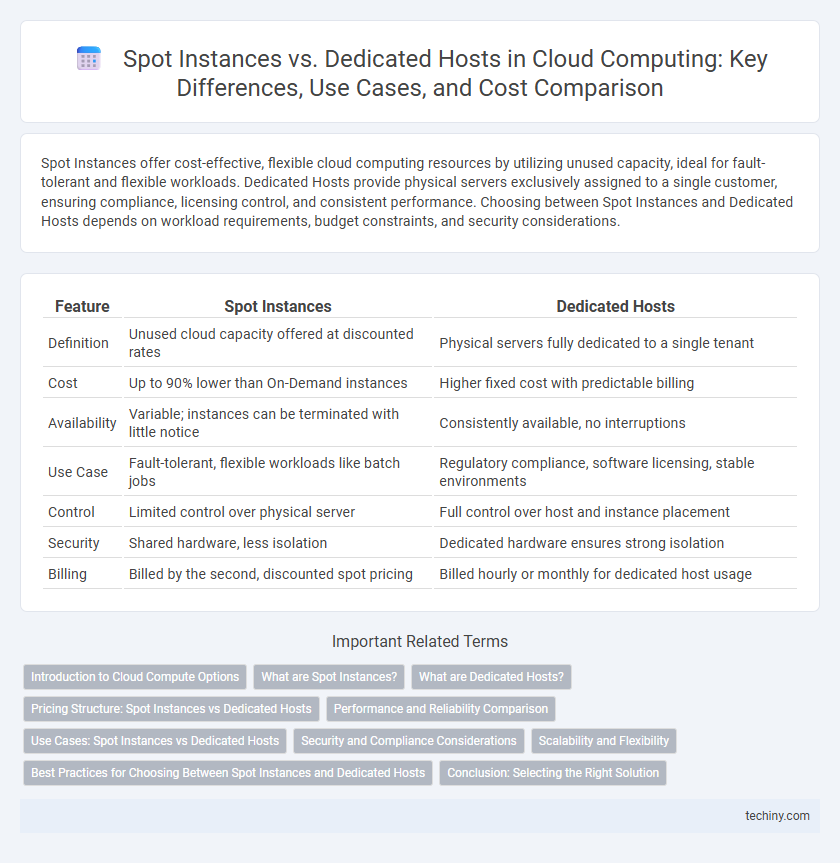Spot Instances offer cost-effective, flexible cloud computing resources by utilizing unused capacity, ideal for fault-tolerant and flexible workloads. Dedicated Hosts provide physical servers exclusively assigned to a single customer, ensuring compliance, licensing control, and consistent performance. Choosing between Spot Instances and Dedicated Hosts depends on workload requirements, budget constraints, and security considerations.
Table of Comparison
| Feature | Spot Instances | Dedicated Hosts |
|---|---|---|
| Definition | Unused cloud capacity offered at discounted rates | Physical servers fully dedicated to a single tenant |
| Cost | Up to 90% lower than On-Demand instances | Higher fixed cost with predictable billing |
| Availability | Variable; instances can be terminated with little notice | Consistently available, no interruptions |
| Use Case | Fault-tolerant, flexible workloads like batch jobs | Regulatory compliance, software licensing, stable environments |
| Control | Limited control over physical server | Full control over host and instance placement |
| Security | Shared hardware, less isolation | Dedicated hardware ensures strong isolation |
| Billing | Billed by the second, discounted spot pricing | Billed hourly or monthly for dedicated host usage |
Introduction to Cloud Compute Options
Spot Instances offer cost-effective, flexible cloud compute capacity by utilizing unused resources at discounted rates, ideal for interruptible workloads. Dedicated Hosts provide physical servers exclusively for a single tenant, ensuring compliance, licensing, and consistent performance for critical applications. Choosing between Spot Instances and Dedicated Hosts depends on workload requirements, budget constraints, and compliance needs within cloud computing strategies.
What are Spot Instances?
Spot Instances are unused cloud computing capacities offered at significantly reduced prices compared to on-demand instances, enabling cost-effective scaling for flexible workloads. These instances are ideal for fault-tolerant applications such as big data analysis, batch processing, and development environments, where interruptions can be tolerated. Cloud providers reclaim Spot Instances with short notice, making them less reliable but highly economical for temporary or non-critical computing tasks.
What are Dedicated Hosts?
Dedicated Hosts provide a physical server fully dedicated to a single tenant, enabling greater control over hardware and compliance requirements in cloud computing environments. These hosts support licensing policies for software that requires dedicated physical resources, enhancing security and visibility compared to shared infrastructure. Organizations leverage Dedicated Hosts to run workloads with strict regulatory mandates or specialized software that cannot run on multi-tenant instances.
Pricing Structure: Spot Instances vs Dedicated Hosts
Spot Instances offer significantly lower pricing by utilizing unused cloud capacity with variable hourly rates that fluctuate based on demand and supply. Dedicated Hosts provide a fixed pricing structure, billed hourly or monthly, offering predictable costs tailored for continuous workloads requiring physical server allocation. Choosing between Spot Instances and Dedicated Hosts depends on budget flexibility and application reliability requirements.
Performance and Reliability Comparison
Spot Instances provide cost-effective cloud computing by utilizing unused capacity, offering high performance for flexible, fault-tolerant workloads but with potential interruptions affecting reliability. Dedicated Hosts guarantee consistent performance by allocating physical servers exclusively to a single tenant, ensuring compliance and predictable workloads with enhanced reliability. Performance on Dedicated Hosts remains stable and uninterrupted, while Spot Instances deliver lower costs but require fault-tolerant architectures due to possible sudden termination.
Use Cases: Spot Instances vs Dedicated Hosts
Spot Instances are ideal for fault-tolerant, flexible workloads such as big data analysis, batch processing, and CI/CD pipelines that can withstand interruptions and take advantage of lower costs. Dedicated Hosts provide exclusive hardware tenancy suitable for compliance-sensitive applications, licensing-bound software, and workloads requiring consistent performance and isolation. Choosing between Spot Instances and Dedicated Hosts depends on cost sensitivity, workload interruption tolerance, and regulatory requirements.
Security and Compliance Considerations
Spot Instances offer cost-effective cloud resources with dynamic availability but introduce variability in control, increasing security risks and complicating compliance due to shared hardware environments. Dedicated Hosts provide physical servers dedicated to a single tenant, enhancing security through isolation and enabling strict compliance with regulations like HIPAA, GDPR, and PCI DSS by allowing precise hardware-level control and audit capabilities. Enterprises requiring stringent compliance and full data isolation typically prefer Dedicated Hosts for sensitive workloads, while Spot Instances suit cost-sensitive tasks with flexible security requirements.
Scalability and Flexibility
Spot Instances offer high scalability by allowing rapid access to spare cloud capacity at significantly lower costs, ideal for flexible workloads that can tolerate interruptions. Dedicated Hosts provide consistent performance with physical server allocation but lack the elasticity needed for scaling dynamic workloads quickly. Organizations requiring agile resource management prioritize Spot Instances for their flexibility, while Dedicated Hosts serve compliance-driven environments demanding dedicated infrastructure.
Best Practices for Choosing Between Spot Instances and Dedicated Hosts
Choosing between Spot Instances and Dedicated Hosts depends on workload stability and cost sensitivity; Spot Instances offer significant savings for flexible, fault-tolerant applications, while Dedicated Hosts provide consistent performance and compliance for steady-state or regulatory-sensitive workloads. Implementing automated scaling and interruption handling optimizes the benefits of Spot Instances, whereas Dedicated Hosts are best suited for applications requiring reserved capacity and license management. Evaluating performance consistency, cost constraints, and compliance requirements ensures alignment with business goals and cloud strategy.
Conclusion: Selecting the Right Solution
Spot Instances offer significant cost savings for flexible, interruptible workloads by leveraging unused cloud capacity, making them ideal for batch processing and development environments. Dedicated Hosts provide enhanced control, compliance, and security, suitable for enterprise applications with strict regulatory requirements or licensing constraints. Choosing between Spot Instances and Dedicated Hosts depends on workload tolerance for interruptions, licensing needs, and cost optimization strategies in cloud computing deployments.
Spot Instances vs Dedicated Hosts Infographic

 techiny.com
techiny.com